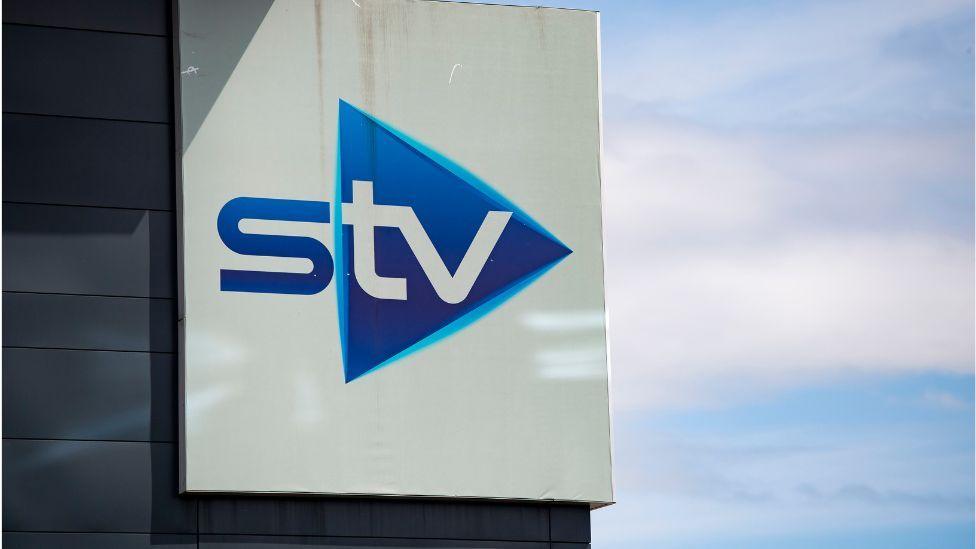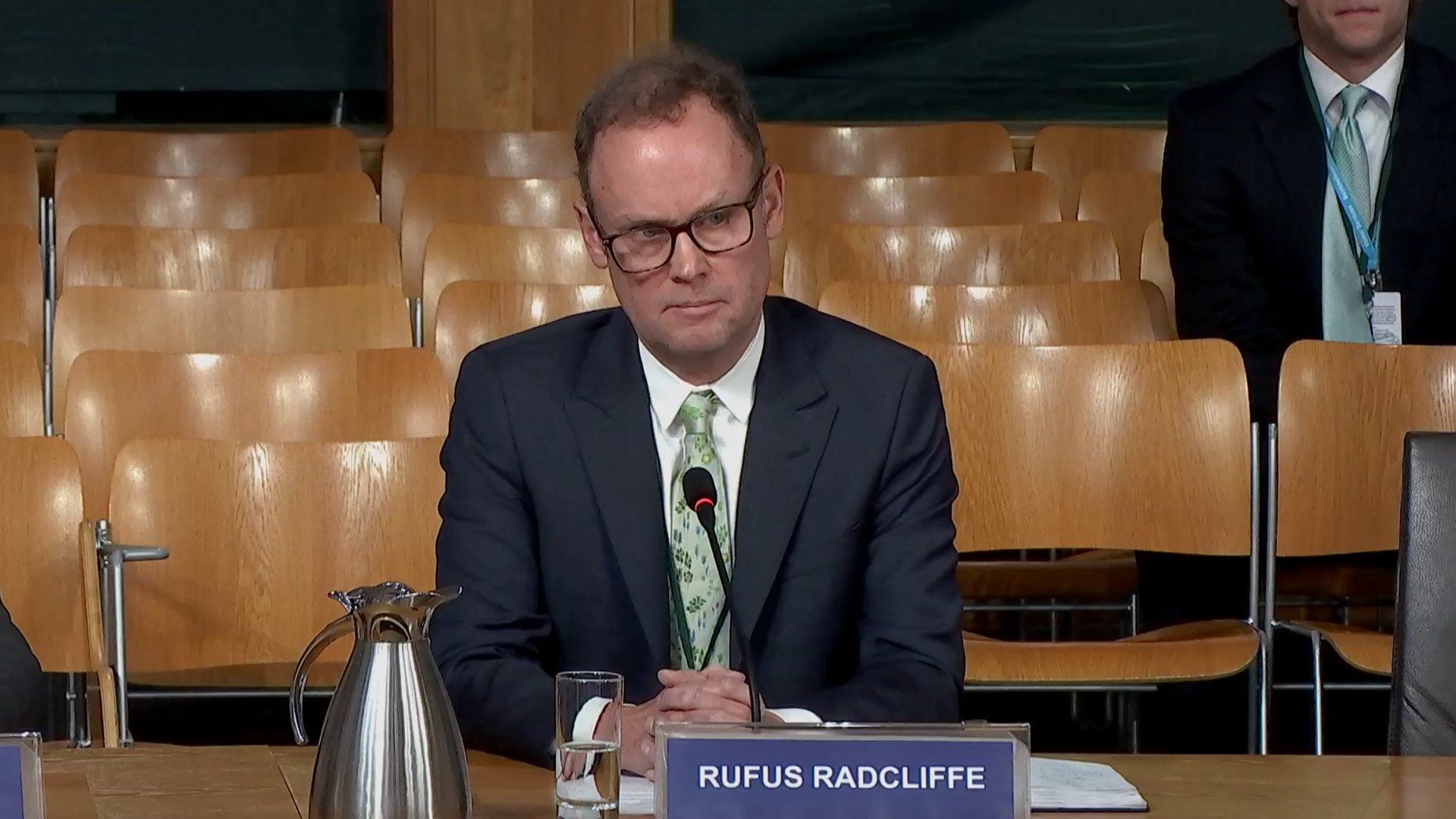STV accused of financial mismanagement over plan to cut news show

STV is seeking £2.5m of savings by next year
- Published
STV bosses have been accused of financial mismanagement and cultural vandalism after announcing plans to cut jobs and axe a north of Scotland news programme.
The company is planning to lose about 60 staff and has started a voluntary redundancy programme.
Speaking to MSPs, unions said the plans were irrational and the result of "panicked" decisions.
STV chief executive Rufus Radcliffe insisted that the broadcaster was doing all it could to protect jobs and put the business on a sustainable footing.
Mr Radcliffe also denied that an announcement about the cuts had been mishandled after it was alleged one senior boss dialled into the virtual meeting from a holiday villa.
STV to cut 60 jobs and axe north news programme
- Published25 September
Culture secretary 'deeply concerned' over STV cuts
- Published27 September
STV is seeking £2.5m of savings by next year after announcing a £200,000 loss in the first six months of 2025.
Under its plans, a news programme produced in Aberdeen for the north of Scotland would be replaced by a show presented from Glasgow including stories from across central and northern Scotland. This already happens at weekends.
Critics point out that the plans came just weeks after STV announced it had made a "significant investment" in its Aberdeen and Glasgow studios.
The revamped Aberdeen studio will be a "back-up" to Glasgow under the new proposals.
There has also been criticism of plans to spend £500,000 this year on setting up a new STV radio station, which is due to go live next year.
'Panicked' decision
Nick McGowan-Lowe, national organiser for Scotland at the National Union of Journalists, described the move to cut the Aberdeen programme as an act of "cultural vandalism".
He accused the company of financial mismanagement and of making a "rushed through, panicked" decision.
"This does not give the impression of a company who is thinking long term," he told MSPs on Holyrood's culture committee.
"They're doing a knee-jerk reaction and what they are proposing is going to have a catastrophic effect on local democracy and the culture of the north east if it is allowed to go through."
STV recently signed a 10-year deal for north and central Scotland TV licences, which came into force in January.
However, the company is now seeking to amend that deal so it can share material from both regions.
Mr McGowan-Lowe likened cutting spending while setting up a new radio station to "buying a sports car and then trying to pay less on the mortgage to afford it".
He added that he was "astonished" STV was not reviewing its plans for a radio station.
Paul McManus, negotiations officer at Bectu, said STV had spent millions of pounds on bonuses for senior executives, refurbished studios and on the radio station.
He said committing to such outlay shortly before announcing major cuts was not "rational".

STV chief executive Rufus Radcliffe spoke to Holyrood's culture committee
Mr Radcliffe told MSPs he had done "everything possible" to protect jobs in the long term, telling MSPs: "Supporting colleagues is our priority."
He said the plans were designed to protect regional journalism, which he insisted was not financially sustainable in its current form.
Mr Radcliffe told the committee that the changes "will be good for everyone at STV and make us a sustainable business moving forward that everyone benefits from".
STV bosses announced their plans for job cuts and programming changes in a video call to staff.
Video call claims
MSPs on the committee cited claims that one senior member of staff dialled in from a holiday villa.
Another is said to have joined the call from a hotel in Aberdeen, before coming into the office to speak to staff in person.
Green MSP Patrick Harvie said some STV workers had been insulted by that decision and suggested that the announcement had not been "handled well".
Mr Radcliffe said a video call was a "standard way of communicating" in a large business and that all senior leaders were present on the call.
He told the committee that some aspects of the call had been "mischaracterised" and that bosses had "done everything we can to be clear and transparent with people".
The chief executive said there would be no bonus payments for senior staff this year and that launching the radio station was an essential part of plans to grow the business.
He said the broadcaster was dealing with a drop in advertising revenue and a slow-down in commissioning for STV Studios.
Viewer numbers for the broadcaster's flagship bulletin, STV News At 6, fell by 23% in the first six months of this year, compared with the same period in 2024, MSPs were told.
Regulator Ofcom said it was working with STV to discuss the proposed changes. It is expected to launch a consultation in the coming weeks.
Scottish director Glenn Preston said in a letter to MSPs: "While we are not able to commit to a timeline for any consultation at this stage, I do want to reassure the committee that Ofcom is aware of the strength of feeling these proposals have generated and the need for any process to be as swift as possible, not least given the potential impact on people's jobs."
Ofcom could potentially reject the changes, approve them in their entirety or approve a compromise proposal.
However, the watchdog does not have the power to save jobs directly or insist on studio presentation continuing in Aberdeen.

This was a tense and, at times, uncomfortable session at the culture committee.
It is very unusual to see the chief executive of a private company questioned quite so forcibly by politicians in a parliament to which they are not accountable.
As SNP MSP Keith Brown pointed out, STV could be congratulated on uniting all the political parties against its proposals in an election year.
There seem to be two distinct but related issues to consider.
One is the question of changing news consumption. Fewer people are watching TV news and more people are getting their news online. That is a challenge across the industry.
The other factor is STV's current financial situation.
A profits warning in July led to a collapse in the share price. The company is now worth little more than £50m on the stock market.
It lost £200,000 in the first half of the year although it is expected to be profitable over the year as a whole.
Both these factors are important. Any business has to consider where its customers are and where they may be in the future. It also has a duty to try to deliver for its shareholders.
But politicians and unions are finding it hard to accept why the company's strategy has changed so suddenly. They wonder if the current financial situation is the driving force for long-term change.
- Published25 September
